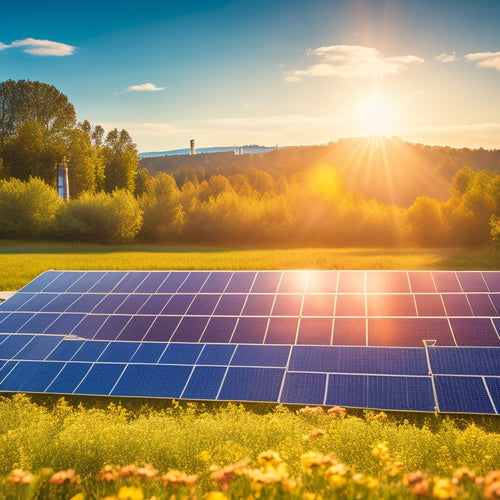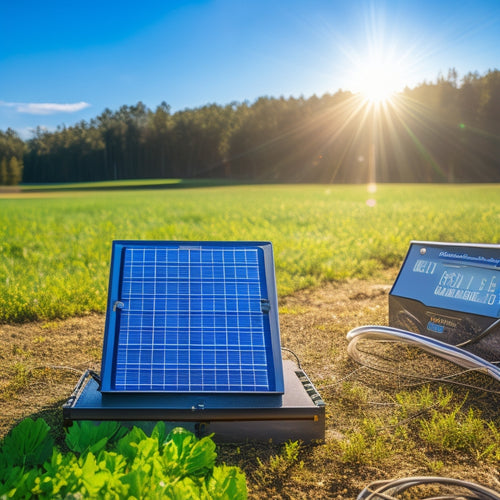
Off Grid Solar Power Systems
Share
You're about to reveal the secret to achieving energy independence with off-grid solar power systems, which can generate enough electricity to power your entire home and even eliminate your energy bills altogether. These systems utilize renewable energy from the sun, ensuring a reliable supply of electricity and breaking free from traditional grid-based energy. By calculating your daily energy usage and understanding your consumption patterns, you can design a system that meets your energy needs and secures a sustainable future. As you investigate the world of off-grid solar power, you'll uncover the best combination of solar panels, inverters, and battery storage to take your independence to the next level.
The Essentials
- Off-grid solar power systems provide energy independence and self-sufficiency by harnessing sunlight for daily power generation.
- A well-designed system requires accurate assessment of daily energy usage, including listing all electrical appliances and their daily usage.
- High-efficiency inverters with Maximum Power Tracking (MPT) technology optimize energy harvest from solar panels, increasing energy independence.
- Deep cycle batteries with high depth of discharge (DOD) ratings and regular maintenance ensure reliable energy storage and extended battery life.
- Effective energy management strategies, including load management and behavioral changes, reduce energy consumption and enhance overall system efficiency.
Energy Independence Guaranteed Daily
You're on the path to energy independence with off-grid solar power systems, which utilize renewable energy sources like sunlight to generate power daily.
By capitalizing on these sources, you can produce electricity consistently, ensuring a reliable supply of power every day.
With the ability to break free from traditional grid-based energy, you can achieve renewable energy independence and self-sufficiency.
Furthermore, off-grid solar power systems address the common pain points of designing and installing a reliable system, high upfront costs, and durability concerns.
As you'll see, daily power generation is a critical aspect of achieving energy independence, and off-grid solar power systems make it possible.
Renewable Energy Sources
As the world shifts towards a more sustainable future, renewable energy sources have become an essential component of off-grid solar power systems, guaranteeing energy independence on a daily basis.
You're probably aware that relying on fossil fuels is no longer a viable option, and that's where solar technology comes in. By utilizing the sun's energy, you can power your home, farm, or business without contributing to climate change.
With an off-grid solar kit, you can solve three major problems that come with relying on the grid or generators: high energy costs, noisy and polluting fuel-based systems, and limited access to power in remote areas.
Renewable energy sources offer a clean, sustainable, and reliable alternative to traditional energy sources. With off-grid solar power systems, you're no longer tied to the grid, giving you the freedom to live life on your own terms.
Sustainable living is now within reach, and it starts with embracing renewable energy sources. By investing in solar technology, you're not only reducing your carbon footprint but also securing a sustainable future for generations to come.
Daily Power Generation
With every new dawn, off-grid solar power systems spring to life, utilizing the sun's energy to guarantee daily power generation and energy independence.
As you adopt this sustainable lifestyle, you'll rely on your solar panel array to capture the sun's rays and convert them into electrical energy. The type of solar panel you choose will greatly impact your daily power generation. Monocrystalline and polycrystalline solar panels are popular options, each offering unique benefits regarding efficiency and cost.
By investing in a high-quality home battery storage solution, you can store excess energy generated by your solar panels and optimize your energy consumption to reduce reliance on the grid. This is especially important for homeowners who want to maximize their solar panel investment and minimize their electricity bills.
As the sun shines, your solar panels will generate power, and your system's charge controller will regulate the flow of energy to your battery storage. This is where the magic happens – your battery storage system will absorb excess energy during the day, allowing you to tap into it when the sun dips below the horizon.
With a well-designed off-grid solar power system, you'll enjoy a steady supply of electricity, no matter the time of day. By combining the right solar panel types with sufficient battery storage, you'll be well on your way to achieving energy independence and breaking free from the grid.
Zero Energy Bills Guaranteed
You'll reap financial benefits with an off-grid solar power system, as you'll save money now on energy costs.
By utilizing renewable energy from the sun, you'll greatly reduce your reliance on the grid, leading to lower energy bills.
With remote solar power systems, such as those designed for cabin solar panel installations, you can enjoy the benefits of off-grid living.
With an off-grid system, you can effectively eliminate your energy expenses, enjoying the peace of mind that comes with zero energy bills guaranteed.
Save Money Now
Take control of your energy expenses by ditching traditional power sources and switching to an off-grid solar power system.
With rising energy costs, it's crucial to investigate cost-effective solutions that can help you save money now. By utilizing the power of the sun, you can greatly reduce your energy bills and enjoy long-term financial freedom.
An off-grid solar power system is a budget-friendly option that allows you to generate your own electricity, reducing your reliance on the grid.
Renewable Energy Source
By utilizing the power of the sun, an off-grid solar power system becomes a reliable renewable energy source, guaranteeing zero energy bills.
You'll no longer be bound to the grid, freeing you from the constraints of traditional energy providers. With solar panel technology advancing rapidly, the efficiency and affordability of capturing solar energy have increased considerably.
This means you can now generate clean, sustainable power for your home or business, reducing your carbon footprint and contributing to a cleaner environment.
As you shift to off-grid solar power, you'll be embracing sustainable living, where your energy independence is matched only by your environmental responsibility.
You'll enjoy the peace of mind that comes with knowing your energy bills are a thing of the past, allowing you to allocate your resources elsewhere.
High-Efficiency Inverters Explained
You're likely familiar with the concept of inverter efficiency, but it's essential to understand the ratings and how they impact your off-grid solar power system's performance, especially when setting up a self-sufficient alternative power set up that generates electricity anywhere without relying on public utilities.
Inverter efficiency ratings, typically ranging from 90% to 98%, represent the percentage of DC power converted to usable AC power.
To maximize your system's energy yield, you'll want to guarantee your inverter incorporates maximum power tracking (MPT) to optimize energy production.
Inverter Efficiency Ratings
In the quest for ideal off-grid solar power system performance, inverter efficiency ratings play a critical role. You need to understand how these ratings impact your system's overall energy output.
Inverters convert DC power from your solar panels to AC power for your home or business. The efficiency rating measures how well they do this conversion.
There are different inverter types, each with its own efficiency standards. String inverters, for instance, have an average efficiency rating of 95-97%. Microinverters, on the other hand, have higher ratings, typically above 97%. The highest-efficiency inverters, like those from premium manufacturers, can reach efficiencies of up to 99%.
When selecting an inverter, look for the California Energy Commission (CEC) efficiency rating, which is a standardized measure of an inverter's performance. A higher CEC rating typically means more energy output for your system.
Maximum Power Tracking
Most high-efficiency inverters employ Maximum Power Tracking (MPT) technology to optimize energy harvest from your solar panels. This advanced technology guarantees you get the most out of your solar panel efficiency, even when environmental conditions aren't ideal.
MPT works by continuously monitoring the voltage and current output of your solar panels and adjusting the inverter's operating point to maximize power production. This results in up to 10% more energy harvested from your solar panels compared to traditional inverters.
With MPT, you can enjoy increased energy independence and reduced reliance on grid connection alternatives. By maximizing your solar panel's energy output, you'll be able to store more energy in your batteries, powering your off-grid lifestyle.
Additionally, MPT technology enables your inverter to adapt to changing environmental conditions, such as cloud cover or temperature fluctuations, guaranteeing a consistent and reliable energy supply.
Assess Your Energy Demands
You need to determine your daily energy usage to specify the correct off-grid solar power system size. This involves calculating your total daily energy consumption in watt-hours (Wh) and identifying your energy consumption patterns, such as peak usage times and seasonal variations.
By understanding your energy demands, you can design a system that meets your specific needs and guarantees a reliable, consistent power supply.
Additionally, incorporating a home energy management system can help you monitor and control your energy usage, optimizing your off-grid solar power system's performance.
Daily Energy Usage
Determining your daily energy usage is vital to designing an off-grid solar power system that meets your specific needs. You'll need to calculate how much energy you use each day to determine the size of your solar panel array and energy storage options. Start by making a list of all your electrical appliances and devices, including lights, refrigerators, computers, and TVs. Then, estimate how many hours each device is used daily.
| Appliance | Daily Usage (hours) | Wattage |
|---|---|---|
| Refrigerator | 24 | 150 |
| Laptop | 8 | 65 |
| LED Light | 12 | 9 |
Add up the total daily energy usage in watt-hours (Wh) to get your total daily energy demand. This will help you determine the size of your solar panel array and energy storage system. Regular solar panel maintenance will also be essential to guarantee your system operates at peak efficiency. By accurately evaluating your daily energy usage, you'll be able to design an off-grid solar power system that provides you with the freedom and independence you desire.
Energy Consumption Patterns
Accurate assessment of your energy demands involves analyzing your energy consumption patterns to identify peak usage periods and understand how your daily habits impact your energy needs.
Conducting an energy audit helps you identify consumption trends and usage patterns in your household. You'll uncover which appliances consume the most energy and when they're used most frequently.
Peak hours, typically morning and evening, require careful load management to avoid overloading your system. By understanding your household habits, you can develop efficiency strategies to reduce energy consumption during these periods.
For instance, you can implement behavioral changes, such as running appliances during off-peak hours or upgrading to energy-efficient appliances.
Investing in a monitoring system allows you to track your energy usage in real-time, making adjustments as needed. This data-driven approach helps you refine your energy management strategy, ensuring your off-grid solar power system operates at ideal levels.
Longer Battery Life Guaranteed
When you're designing an off-grid solar power system, you'll want to guarantee your batteries can handle the demands of your energy usage.
That's where deep cycle batteries come in, specifically designed to withstand the rigors of daily charging and discharging.
Deep Cycle Battery
Reliability is key when it comes to off-grid solar power systems, and a deep cycle battery is the heart of this reliability. As you design your off-grid system, you need a battery that can withstand the demands of daily use. A deep cycle battery is specifically designed to provide a steady flow of energy over a long period, making it ideal for off-grid applications.
You'll want to take into account a battery with a high number of charging cycles, as this will affect its overall lifespan. A deep cycle battery can last for 5-7 years or more, depending on factors such as battery maintenance and charging cycles.
Regular maintenance is vital to extend the life of your battery. This includes monitoring the state of charge, keeping the terminals clean, and avoiding deep discharges.
When selecting a deep cycle battery, look for a high depth of discharge (DOD) rating, as this indicates the battery's ability to provide power over an extended period. A higher DOD rating means you can use more of the battery's capacity, giving you more power and flexibility in your off-grid system.
Frequently Asked Questions
How Do I Maintain My Off-Grid Solar Power System?
To maintain your independence, you'll want to prioritize battery maintenance, ensuring they're charged and balanced, then regularly clean solar panels, perform inverter checks, and monitor the charge controller to optimize energy efficiency and guarantee reliable system performance.
Can I Install an Off-Grid System Myself?
Like a skilled builder, you're considering DIY installation, but don't let enthusiasm cloud judgment; prioritize safety considerations, ensuring a secure foundation for your off-grid system, and carefully weigh the risks before taking the reins.
Are There Any Government Incentives for Off-Grid Systems?
You'll be glad to know that yes, you're eligible for federal rebates and tax credits when pursuing energy independence, which can considerably offset installation costs, making it more affordable to reap the environmental benefits, with various financing options available.
Can I Use My Existing Electrical Panel With Off-Grid Solar?
As you commence on your path to energy independence, you'll find that your existing electrical panel might not be ready for the freedom of off-grid living; its compatibility will depend on the conversion process, so it's essential to assess its suitability for the off-grid upgrade.
Will I Still Have Power During a Grid Outage With Off-Grid Solar?
If you're wondering if you'll have power during an outage, the answer is yes, you will, as long as you've got a battery bank with sufficient capacity and your solar panels maintain high efficiency, ensuring a reliable backup power supply.
Final Thoughts
As you utilize the sun's fiery energy, you break free from the shackles of grid dependency, bathing in the warm glow of self-sufficiency. Your off-grid solar power system is the guiding light of independence, illuminating a path to zero energy bills and a carbon footprint as light as a feather. With high-efficiency inverters and carefully calibrated batteries, your energy demands are met with precision, ensuring a brighter tomorrow, today.
Related Posts
-

Advantages of Solar Generating Systems Over Traditional Energy
Solar generating systems provide several key advantages over traditional energy sources. You'll experience lower long...
-

Why Outdoor Solar Lighting Systems Are Sustainable
Outdoor solar lighting systems are sustainable because they utilize renewable energy, drastically reducing your carbo...
-

Choosing the Right Solar Power Charge Controller
Choosing the right solar power charge controller is crucial for maximizing energy efficiency and extending battery li...


